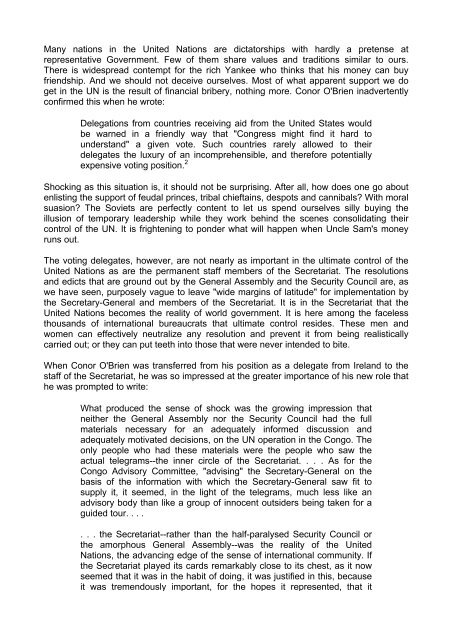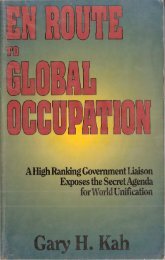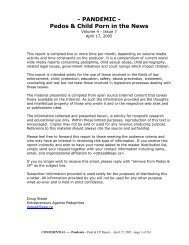G. Edward Griffin - The Fearful Master - PDF Archive
G. Edward Griffin - The Fearful Master - PDF Archive
G. Edward Griffin - The Fearful Master - PDF Archive
Create successful ePaper yourself
Turn your PDF publications into a flip-book with our unique Google optimized e-Paper software.
Many nations in the United Nations are dictatorships with hardly a pretense at<br />
representative Government. Few of them share values and traditions similar to ours.<br />
<strong>The</strong>re is widespread contempt for the rich Yankee who thinks that his money can buy<br />
friendship. And we should not deceive ourselves. Most of what apparent support we do<br />
get in the UN is the result of financial bribery, nothing more. Conor O'Brien inadvertently<br />
confirmed this when he wrote:<br />
Delegations from countries receiving aid from the United States would<br />
be warned in a friendly way that "Congress might find it hard to<br />
understand" a given vote. Such countries rarely allowed to their<br />
delegates the luxury of an incomprehensible, and therefore potentially<br />
expensive voting position. 2<br />
Shocking as this situation is, it should not be surprising. After all, how does one go about<br />
enlisting the support of feudal princes, tribal chieftains, despots and cannibals? With moral<br />
suasion? <strong>The</strong> Soviets are perfectly content to let us spend ourselves silly buying the<br />
illusion of temporary leadership while they work behind the scenes consolidating their<br />
control of the UN. It is frightening to ponder what will happen when Uncle Sam's money<br />
runs out.<br />
<strong>The</strong> voting delegates, however, are not nearly as important in the ultimate control of the<br />
United Nations as are the permanent staff members of the Secretariat. <strong>The</strong> resolutions<br />
and edicts that are ground out by the General Assembly and the Security Council are, as<br />
we have seen, purposely vague to leave "wide margins of latitude" for implementation by<br />
the Secretary-General and members of the Secretariat. It is in the Secretariat that the<br />
United Nations becomes the reality of world government. It is here among the faceless<br />
thousands of international bureaucrats that ultimate control resides. <strong>The</strong>se men and<br />
women can effectively neutralize any resolution and prevent it from being realistically<br />
carried out; or they can put teeth into those that were never intended to bite.<br />
When Conor O'Brien was transferred from his position as a delegate from Ireland to the<br />
staff of the Secretariat, he was so impressed at the greater importance of his new role that<br />
he was prompted to write:<br />
What produced the sense of shock was the growing impression that<br />
neither the General Assembly nor the Security Council had the full<br />
materials necessary for an adequately informed discussion and<br />
adequately motivated decisions, on the UN operation in the Congo. <strong>The</strong><br />
only people who had these materials were the people who saw the<br />
actual telegrams--the inner circle of the Secretariat. . . . As for the<br />
Congo Advisory Committee, "advising" the Secretary-General on the<br />
basis of the information with which the Secretary-General saw fit to<br />
supply it, it seemed, in the light of the telegrams, much less like an<br />
advisory body than like a group of innocent outsiders being taken for a<br />
guided tour. . . .<br />
. . . the Secretariat--rather than the half-paralysed Security Council or<br />
the amorphous General Assembly--was the reality of the United<br />
Nations, the advancing edge of the sense of international community. If<br />
the Secretariat played its cards remarkably close to its chest, as it now<br />
seemed that it was in the habit of doing, it was justified in this, because<br />
it was tremendously important, for the hopes it represented, that it



![Robert T McQuaid [rtmq@stn.net] Sent: Friday, October 29, 2004 12 ...](https://img.yumpu.com/51070071/1/190x245/robert-t-mcquaid-rtmqstnnet-sent-friday-october-29-2004-12-.jpg?quality=85)







